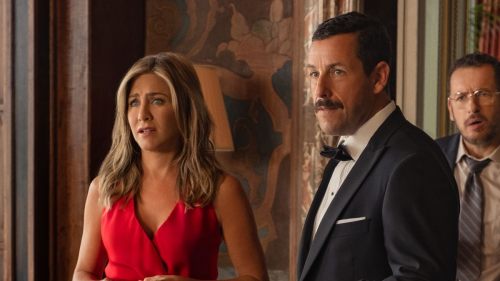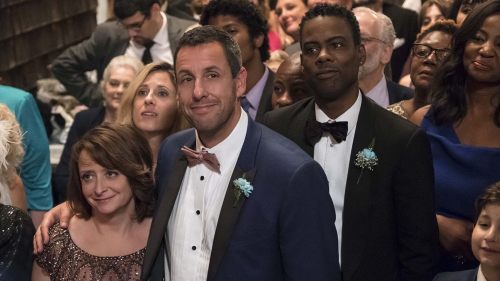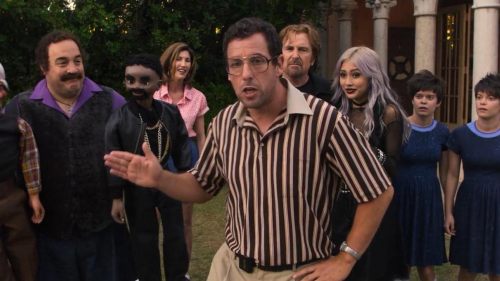THE MEYEROWITZ STORIES (NEW AND SELECTED) Review: The Royal Baumbach
Noah Baumbach's interests don't stretch too far, as he's mostly concerned with tackling the upper middle class malaise of New York (often pseudo-) intellectuals, all looking to make a name for themselves in one way or another. Even when he branches out and crafts character portraits of young women like Frances Ha or Mistress America, Baumbach's still operating within a microcosm of educated, priveleged women, each in search of a defining purpose. With The Meyerowitz Stories (New and Selected), the filmmaker's returned to a disgruntled familial unit that resembles the Berkmans (from his 2005 breakout The Squid and the Whale). The product of another divorce (or three), the barely-there sculptor patriarch (Dustin Hoffman) is now taken by a drunken disaster (Emma Thompson); constantly rambling about the importance of his work, and neglecting his three children - a successful finance manager to the stars (Ben Stiller), a newly divorced never-was musician (Adam Sandler), and a nebbish but well-adjusted caretaker (Elizabeth Marvel). The Meyerowitz Stores doesn't so much follow a plot as it's a series of connected vignettes, all presented in order with simple literary title card intros (example: "Danny was trying to park..."), shifting the perspective between members throughout their latest taxing get together.
"You have an idea of yourself, and you want to hold on to that." This might be the key line to unlocking this shouting, often bitingly funny examination of these harried New Yorkers, born from a bohemian (who was always sort of a status whore). Harold (Hoffman) gruffly fits the bill of an artist who thinks he's always been better than he actually was, coughing up criticisms of colleagues' "minor" works, while practically begging anyone he comes in contact with to help him either obtain or promote a show of his own. Maureen (Thompson) is the hippy-dippy fourth wife, who's content to watch the old fool wind himself up and then tucker himself out, as Danny (Sandler) frets about the upcoming sale of his dad's Manhattan home (and, in turn, all the pieces contained within). As he and Jean (Marvel) continue to try and talk sense into their competitive papa (who bats them off with the same stories and jokes he's told time and again), we get a sense that this is how it's always been for these folks. If it weren't the house/art sale, there'd be another point of contention they'd be debating, as their father simply refuses to listen before making his son dress up in a tuxedo to accompany him to a contemporary's show (where no one else is in black tie). Little by little, their respective insecurities and family improprities slip out, though no one in the clan is ready to go to war with each other over annoyances that range between trivial and deeply profound.
The most notable element of The Meyerowitz Stories - outside of Baumbach remolding/perfecting a formula he's worked on so many times - is Adam Sandler. Ever since Paul Thomas Anderson subverted the lowbrow comedian's mumbly/shouty manchild dynamic so successfully with his (still slightly underrated) masterwork, Punch Drunk Love, Sandler's shown up sparsely throughout the years to try and pull off the same magic trick. Judd Apatow's Funny People dug into his current artistic stagnation, but since then he's really only continued to churn out absolute dreck (such as the Grown Ups movies), or outlandish high concept yuk-yuks that are really only good for a morbid curiosity watch (we're looking at you, The Cobbler). With The Meyerowitz Stories, Sandler never really devolves into shtick, or seems to be playing on his pre-established persona (outside of one aggravated scream at another driver that's cut off mid-holler). Instead, he gets to play Danny as a lost, brokenhearted dad, seeing his kid (Grace Van Patten) off to college, which leads to agitated nervousness when she doesn't immediately respond to his texts. To be honest, there's never been a Sandler performance this easygoing before, as the actor seems to relish a chance to play an average, urban Joe, wrestling with his overbearing father, while clinging to a beautiful relationship with a daughter on the brink of full-blown adulthood. His long face and puppy dog eyes convey a longing that's never been present before, and its a joy to see the oft-hated performer utilized this well, capitalizing on the promise he showed fifteen years ago for another indie auteur.
Perhaps Baumbach's ability to wring such a lovely, human performance from Sandler was predicted by all the wonderful work he's gotten out of Ben Stiller over the years (with Greenberg arguably acting as the pinnacle of that funnyman's dramatic career). Only, where Sandler is completely abandoning the routines we've come to expect, The Meyerowitz Stories sees Stiller tweaking a type (the uptight workaholic) we've seen him indulge countless times. When working with Baumbach, Stiller's fretting over his latest star client (Adam Driver), who thinks that his new line of gourmet coffee is somehow going to generate a significant revenue steam, transforming Matthew Meyerowitz into a guy genuinely concerned about this artist's economic well-being (despite both of them never really having any semblance of money problems the average audience member would deal with). Just as his director is displaying a distinct maturity, telling similar stories over the last two decades, Stiller is seemingly trying to perfect an archetype through insight and affection, instead of caustic parody. These two have been a director/actor pairing to watch for years, yet have gone somewhat overlooked whenever that topic is raised amongst cinephiles.
Noah Baumbach has always been a "daddy issues" sort of director, just like his good pal Wes Anderson. But where Anderson already channeled his neuroses perfectly through The Royal Tenenbaums, Baumbach still feels like he's working a few things out, even by the time we get to the final reel of The Meyerowitz Stories. This isn't a movie where everybody learns a lesson when the end credits roll (though certain characters definitely undergo drastic personal changes), instead opting to show us how some men just cannot be moved, and how stressing over the well-being of those who don't really care about you might not be worth the effort. So, while we're definitely going to see Baumbach continue to tackle the struggles grown men face when coming to terms with their fathers' flaws, The Meyerowitz Stories is the closest we've gotten to his Tenenbaums yet -- a loving portrait of people who keep loving each other, despite the fact that it's probably unhealthy.



